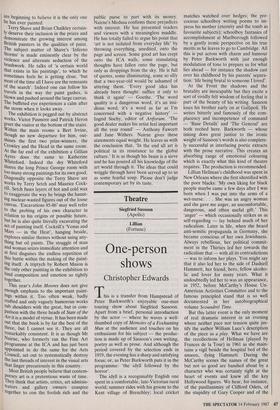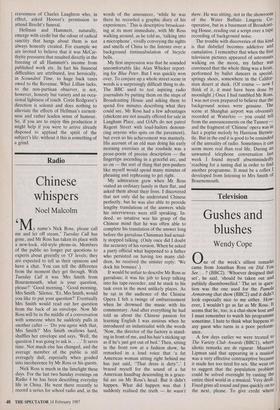Theatre
Siegfried Sassoon (Apollo) Lillian (Fortune)
One-person shows
Christopher Edwards
This is a transfer from Hampstead of Peter Barkworth's enjoyable one-man touring show about Siegfried Sassoon. Apart from a brief, personal introduction by the actor — where he waves a well- thumbed copy of Memoirs of a Foxhunting Man at the audience and touches on his enthusiasm for his subject — the produc- tion is made up of Sassoon's own writing, poetry as well as prose. And although the period covered by the selection ends in 1919, the evening has a sharp and satisfying focus; or, as Peter Barkworth puts it in the programme: 'the idyll followed by the horror'.
The idyll is a recognisably English one spent in a comfortable, late-Victorian rural world; summer rides with his groom to the Kent village of Brenchley; local cricket matches watched over hedges; the pre- cocious schoolboy writing poems to im- press his mother (eternity and the tomb as favourite subjects); schoolboy fantasies of accomplishment at Marlborough followed by a gently ironic perspective on his true merits as he leaves to go to Cambridge. All this is put across with charm and humour by Peter Barkworth with just enough modulation of tone to prepare us for what lies ahead — for instance the shadow cast over his childhood by his parents' separa- tion: 'life being brutal to someone I loved'.
At the Front the shadows and the brutality are inescapable but they excite a sort of vividly felt wisdom of feeling that is part of the beauty of his writing. Sassoon loses his brother early on at Gallipoli. He writes bitterly and famously of the com- placency and incompetence of command — 'Base Details' and 'The General' are both recited here. Barkworth — whose timing does great justice to the ironic weight of Sassoon's words is also complete- ly successful at interlacing poetic extracts with the prose narrative. This creates an absorbing range of emotional colouring which is exactly what this kind of theatre requires. The production is recommended.
Lillian Hellman's childhood was spent in New Orleans where she first identified with the poor blacks: 'My own liking for black people maybe came a few days after I was born when I was put into the arms of a wet-nurse. . . . She was an angry woman and she gave me anger, an uncomfortable, dangerous, and often useful gift.' This 'anger' — which occasionally strikes us as self-regarding — lay behind much of her radicalism. Later in life, when she heard anti-semitic propaganda in Germany, she became conscious of her own Jewishness. Always rebellious, her political commit- ment in the Thirties led her towards the radicalism that — with all its contradictions — was to inform her plays. You might say that it also led her to the side of Dashiell Hammett, her friend, hero, fellow alcoho- lic and lover for many years. What it undoubtedly led her to was an appearance, in 1952, before McCarthy's House Un- American Activities Committee and to the famous principled stand that is so well documented in her autobiographical volume Scoundrel Time.
But this latter event is the only moment of real dramatic interest in an evening where neither pace nor tension quite jus- tify the author William Luce's description of the piece as a play. What we have are the recollections of Hellman' (played by Frances de la Tour) in 1961 as she main- tains a vigil beside the hospital bed of the unseen, dying Hammett. During the McCarthy scenes the names of the great but not so good are bandied about by a character who was certainly right at the heart of events and knew all the key Hollywood figures. We hear, for instance, of the pusillanimity of Clifford Odets, of the stupidity of Gary Cooper and of the cravenness of Charles Laughton who, in effect, asked Hoover's permission to attend Brecht's funeral.
Hellman and Hammett, naturally, emerge with credit but the odour of radical sanctity that hangs about them is not always honestly created. For example we are invited to believe that it was McCar- thyite pressures that resulted directly in the freezing of all Hammett's income from published work etc. In fact his financial difficulties are attributed, less heroically, in Scoundrel Time, to huge back taxes owed to the Revenue. What Lillian lacks, to the non-partisan observer, is not, however, honesty but variety and an occa- sional lightness of touch. Corin Redgrave's direction is solemn and does nothing to alleviate the effects of Hellman's earnest- ness and rather leaden sense of humour. So, if you are to enjoy this production it might help if you were to arrive already disposed to applaud the spirit of the subject's life: without it this is something of a grind.



























































 Previous page
Previous page